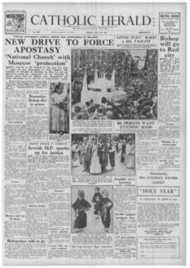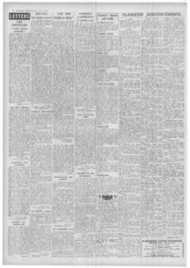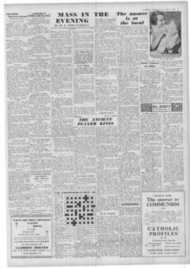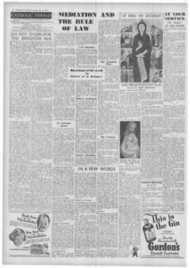Page 3, 21st July 1950
Page 3

Report an error
Noticed an error on this page?If you've noticed an error in this article please click here to report it.
Tags
Share
Related articles
Sauce For The Playwright
Death Of A Salesman
William Poel, By Robert Speaight
The Lost Bard
A
THE ANCIENT PLAYER KINGS
FROM Shakespeare, the player poet, to Shaw, who tried, with genius and without success, to make drama the instrument of politique, the history of our theatre is contained in five actors' lives.
Burbage, Betterton, Garrick, Kean and Irving were the makers of the stage. Each, in youth, was confronted by the testing roles created by Shakespeare. When these tests were passed the player's talent was ripened to full dimensions. He had become a master, the core of a centre of theatrical craftsmanship, preserving and enriching the national heri tage for coming generations. No medium of art shows a steadier line of development than that of the actor. No art can he seen more clearly in the vital relationship with its audience.
Readers, amateur actors. producers, critics, and schoolmasters, from time to time, write asking me for general advice on playgoing. They wish to deepen their appre
ciation. I have a stock answer to such questions, containing, I believe, the best counsel. Read the lives of the great actors!
This being a shabby week in the London theatre I propose to bring to the attention of such readers two books I recommend to every serious student of drama.
THE TRAGIC CLOWN KEAN: By Giles Playfair (Rhein hardt and Evans, 15s.) is subtitled, " The Life and Paradox of the Great Actor," which admirably states its theme, pEW men have had rnore obscure origins than the greatest English player. Born in the year of the
French revolution. Edmund Kean's parentage, on both sides, remains doubtful. He is accepted as the child of Nancy Carey, peddler and actress, and Edmund Kean, an architect's apprentice; Kean's pere's thirst so far exceeded his capacity that. at the age of 22, having drunk himself into a state of imbecility, he " walked off the parapet on the roof of his lodgings " in St. Martin's Lane. Mr. Playfair does not overstate when he describes the boy-genius as the offspring of a " strumpet and a lunatic."
Their influence was to survive and shape Edmund's tragic life. He knew no consistent home. He lodged with his " mother ''; he lived with his "aunt." Taken up by bourgeois patrons, his intolerant pride drove him back to the streets, when his magnificent talents were, in the smallest degree, slighted. At the age of eight or nine he became a vagabond player.
" lie was slender, pale and small
. . one of his legs was in irons. Altogether he scented grubby. unkempt, half-starved. He was, in spite of his poverty-stricken appearance. a strikingly beautiful child. His auburn hair was a rich mass of tangled curls. . . ."
This was the boy who, two years later, played Richard IH-one can imagine the tiny figure, dragging the iron-bound leg, as he broke into the glowing evil opening speech and Macbeth. For Nelson and Lady Hamilton he acted Hamlet.
But his success was short-lived, before he conquered, at the age of 24, with a revolutionary performance of Shylock, he had been singer, tumbler and roustabout in cheap booths. He saw his eldest son die of privations, With one blow he destroyed the accepted style of acting, bringing down the Kemble dynasty. For 20 turbulent years he ruled at Drury Lane, or Covent Garden, until, a broken and prematurely aged man. he died at Richmond.
His life a theme no novelist would invent encompassed the last members of Garrick's generation and the period of the great drama critics, Hazlitt, Leigh Hunt, Coleridge and Lamb. Mr. Playfair has reconstructed it with scrupulous scholarship in a most readable form. The age lives again; the experiments of the chief player are seen for what they were worth-perhaps the greatest achievement of English acting.
JOE IN PARADISE Rip Van Winkle : The Autobio graphy of Joseph Jefferson (Rheinhardt and Evans, 18s,) is the story of a happier genius, a great comedian and father of a theatrical clan. It records the years of pioneering on the American stage, from 1829 until 1890. Jefferson's part in the dramatisation of Washington Irving's classic, Rip Van Winkle, may have marked the commencing point of a true American tradition of drama.
The first actor in the family was Joe's great-grandfather, Thomas Jefferson, who worked with Garrick; there is a delightful story of Joe, on an English tour, taking 24 of newfound cousins to a pantomime which is described with the wide-eyed good humour of a mystified Yankee.
This book, written as the author approached his 70th year, in Paradise Valley where he built a wonderful home for his first love, his family, is rich with meditative wisdom. Its value as a work of reference is supreme. Joe's modest. sage advice to young players is invaluable. He was that priceless being, a great artist who was a great and good man.
blog comments powered by Disqus









